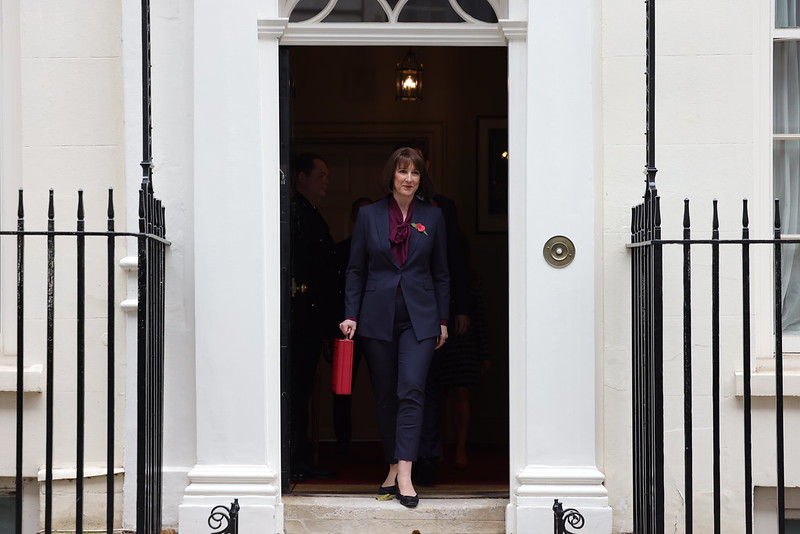Was this a budget for wellbeing?

- by Adam Lang, Carnegie UK
- 30 October 2024
- 7 minute read
The first budget of a new government is always a significant moment. The first budget by a Labour government in 14 years is particularly notable, regardless of party politics. The first UK Government budget by a female Chancellor of the Exchequer is a significant (and long overdue) occasion in British politics and society.
But despite all these landmark moments, how significant was the budget in terms of policy implications for efforts to improve our collective wellbeing?
A welcome focus on long-term change
The Chancellor began with welcome rhetoric on the need to end short-termism in our politics and our investment policies. This was further supported by a recurring narrative of ensuring joined-up delivery across government departments. This was particularly welcome as it was one of the core asks that Carnegie UK made of the Chancellor in our open letter to her in advance of the budget.
Related to this, the commitments on establishing the new Office of Value for Money and the pledge of an integrated approach across departments to key initiatives such as the Get Britain Working again white paper are welcome signals of intent. This kind of joined-up and cross-cutting approach to both governance and delivery of the government’s priorities are important steps in bringing their mission based approach to government off the page and into action. Although tentative, these initiatives suggest that ministers and officials may be starting to act on the advice of the recent Liaison Committee report that called for new approaches to break the cycle of siloed short-termism within Whitehall.
We know that a critical part of putting wellbeing at the heart of decision making in the UK is ensuring that a focus on long-termism is embedded in the thinking and operations of HM Treasury. But we also know how quickly good political rhetoric can clash with reality. The challenge now will be to turn welcome words into clear evidence of new and better ways of working across government departments to invest for change over time.
A mixed picture of investment for social and economic wellbeing
The budget contained some big announcements on investment in capital spending (£100bn over 5 years), an increase in the minimum wage (rising by 6.7%), Carers Allowance uplift as well as additional money for Education and the NHS.
It also highlighted an uplift in general departmental expenditure of around 1.5% year on year, additional grant funding for Local Authorities and investment in housebuilding.
In theory, all of these should contribute to improving the social and economic wellbeing of individuals and communities across the country. The challenge, however, will be in understanding if the detail and the level of these investments is enough to make a tangible impact on the services that people rely on.
For example, while additional investment in housing is to be welcomed in general, the scale of the housing crisis means that the £3.1bn now committed for the Affordable Homes Programme is unlikely to be enough to meet demand. This is especially true as Shelter highlight that England needs around 90,000 new social homes a year to tackle the housing emergency.
And this really matters for our collective wellbeing as our Life in the UK index tells us that where people live has a significant influence on people’s wellbeing across domains.
A missed opportunity on environmental and democratic wellbeing
An area of concern from today’s budget was the lack of focus on policies to support our environmental and democratic wellbeing.
There were announcements in carbon capture technology and confirmations about the location for GB Energy, all of which may in time have an impact on improving climate and environmental issues. But these were tempered by a continued freezing of Fuel Duty and only very minor tweaks to Air Passenger Duty. As such, it is hard to see in these policies any coherent fiscal strategy towards environmental wellbeing.
In addition, there was almost no mention about efforts to invest in or improve the health of our democracy. This is something that should be of particular concern to anyone in elected office across the UK as our data shows that a crisis of trust in democratic institutions is one of the biggest issues facing the UK.
At Carnegie UK we believe that the lack of action to improve the health of democracy is the UK government’s missing mission. It is essential that all those in power work to rebuild trust with the people of the UK. A failure to address the root causes of our democratic discontent will further threaten the foundations of our democracy. In this regard, the budget was a missed opportunity for a bold agenda to re-engage people in our democracy and rebuild trust in those we elect to represent us.
Measuring growth alone is not enough
Unsurprisingly for a party that was elected on a commitment to getting the economy growing again, there was a lot of reference to “difficult choices” to help kick-start the economy. But even with this relentless focus on growth as the Chancellor’s measure of success, the estimates she shared today suggest that her policy choices will deliver only modest predicted growth in the coming years.
This underlines the need for a wider and more holistic set of indicators to measure what really matters to people and inform better policy interventions. If annual economic growth is expected to be anaemic at best over the next five years, then it is unlikely that this will translate in a marked improvement in people’s lives to support what are likely to be increasingly difficult policy choices about public service investment in the years ahead.
When we wrote to the Chancellor last month, we highlighted the need for ministers to use the full suite of available wellbeing data to inform their policy choices and track progress over time. This is an important part of why we are committed to publishing our annual Life in the UK index through until 2030 – to help track improvements in people’s lives over time.
If the government is serious about today’s budget being the beginning of a decade of national renewal, then Ministers should draw on and talk about a wider and more useful set of metrics to guide their progress towards this. Today’s budget growth forecasts only highlight the limitation of traditional economic metrics as a proxy for wider policy success.
Chancellor Rachel Reeves outside 11 Downing Street. Picture by Kirsty O’Connor / Treasury
Help us make the case for wellbeing policy
Keep in touch with Carnegie UK’s research and activities. Learn more about ways to get involved with our work.
"*" indicates required fields
